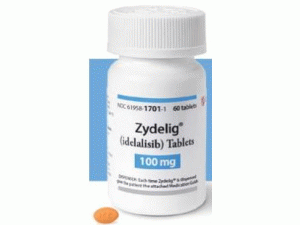艾代拉里斯,艾代拉里斯片Idelalisib(Zydelig 150mg Tablets)
 药店国别:无
产地国家:美国
处方药:是
所属类别: 150毫克/片 60片/瓶
包装规格: 150毫克/片 60片/瓶
计价单位:瓶
生产厂家中文参考译名:无
生产厂家英文名:GILEAD SCIENCES INC
原产地英文商品名:ZYDELIG 150MG TAB 60/EA
原产地英文药品名:idelalisib
中文参考商品译名:ZYDELIG 150毫克/片 60片/瓶
中文参考药品译名:艾代拉里斯
曾用名:无
药店国别:无
产地国家:美国
处方药:是
所属类别: 150毫克/片 60片/瓶
包装规格: 150毫克/片 60片/瓶
计价单位:瓶
生产厂家中文参考译名:无
生产厂家英文名:GILEAD SCIENCES INC
原产地英文商品名:ZYDELIG 150MG TAB 60/EA
原产地英文药品名:idelalisib
中文参考商品译名:ZYDELIG 150毫克/片 60片/瓶
中文参考药品译名:艾代拉里斯
曾用名:无
简介
抗癌新药Zydelig(Idelalisib 中文译名:艾代拉里斯片)由美国吉利德科学公司研发,于2014年7月或FDA批准在美国上市,Zydelig是一种激酶抑制剂,适用为复发慢性淋巴细胞性白血病(CLL)、复发滤泡B-细胞非霍奇金淋巴瘤(FL)、复发性小淋巴细胞淋巴瘤(SLL)的治疗。 批准日期:2014年7月14日 公司:Gilead Sciences,IncZYDELIG(艾代拉里斯 idelalisib)片剂,用于口服 美国最初批准:2014年 警告: 致命和严重的毒性:肝脏,严重腹泻,结肠炎,肺炎,感染和肠道穿孔见完全禁用警告的完整预定信息。 Zydelig治疗的患者中有16%至18%发生致命和/或严重肝毒性。在治疗前和治疗期间监测肝功能。中断然后减少或停止Zydelig。 Zydelig治疗的患者中有14%至20%发生致命和/或严重和严重的腹泻或结肠炎。监测严重腹泻或结肠炎的发展。中断然后减少或停止Zydelig。4%的Zydelig治疗患者发生致命和/或严重肺炎。监测肺部症状和双侧间质浸润。中断或停止Zydelig。 Zydelig治疗的患者中有21%至48%发生致命和/或严重感染。监测感染的体征和症状。如果怀疑有感染,请中断Zydelig。 在临床试验中,Zydelig治疗的患者可能发生致命和严重的肠穿孔。如果怀疑肠穿孔,则停止Zydelig。 最近的重大变化:BOXED WARNING(01/2018) 适应症和用法:(01/2018) 剂量和用法:(01/2018) 警告和注意事项:(01/2018) 作用机制 Idelalisib是PI3Kδ激酶的抑制剂,其在正常和恶性B细胞中表达。 Idelalisib诱导细胞凋亡并抑制源自恶性B细胞和原发性肿瘤细胞的细胞系中的增殖。 Idelalisib抑制几种细胞信号传导途径,包括B细胞受体(BCR)信号传导和CXCR4和CXCR5信号传导,它们参与B细胞向淋巴结和骨髓的运输和归巢。 用idelalisib处理淋巴瘤细胞导致抑制趋化性和粘附,并降低细胞活力。 适应症和用法 Zydelig是一种激酶抑制剂,适用于治疗患者:复发的慢性淋巴细胞白血病(CLL)与利妥昔单抗联合用于单独利妥昔单抗因其他合并症而被认为是合适的治疗的患者。在接受至少两次先前全身治疗的患者中复发的滤泡性B细胞非霍奇金淋巴瘤(FL)。在接受至少两次先前全身治疗的患者中复发的小淋巴细胞淋巴瘤(SLL)。 使用限制: Zydelig未标明,不建议用于任何患者的一线治疗。 Zydelig未被指出,不建议与苯达莫司汀和/或利妥昔单抗联合用于治疗FL。 根据总体响应率,FL和SLL获得了加速批准。尚未确定患者存活率或疾病相关症状的改善。这些适应症的持续批准可能取决于确认试验中的临床益处的验证。 剂量和给药:推荐起始剂量:口服150毫克,每日两次。 剂量形式和强度片剂:150mg,100mg。 禁忌症:严重过敏反应的病史,包括过敏反应和中毒性表皮坏死松解症。 警告和注意事 项严重皮肤反应:监测患者是否发生严重皮肤反应并停用Zydelig。 过敏反应:监测患者过敏反应并停用Zydelig。 中性粒细胞减少症:监测血细胞计数。 胚胎 - 胎儿毒性:Zydelig可能导致胎儿伤害。建议女性在服用Zydelig时对胎儿有潜在风险并避免怀孕。 不良反应 在单药治疗试验中接受Zydelig治疗的患者最常见的不良反应(发生率≥20%)是腹泻,疲劳,恶心,咳嗽,发热,腹痛,肺炎和皮疹。 在联合试验中接受Zydelig治疗的患者中最常见的不良反应(发生率≥30%)是腹泻,肺炎,发热,疲劳,皮疹,咳嗽和恶心。常见的实验室异常包括中性粒细胞减少,ALT升高和AST升高。 药物相互作用 强CYP3A抑制剂:如果没有替代疗法,则需要进行额外监测。 强CYP3A诱导剂:避免共同给予强CYP3A诱导剂。 CYP3A底物:避免共同给予敏感的CYP3A底物。 用于特定人群哺乳期:建议女性不要母乳喂养。 包装提供/存储和处理 ZYDELIG 100MG TAB 60/EA IDELALISIB GILEAD SCIENCES INC 61958-1701-01ZYDELIG 150MG TAB 60/EA IDELALISIB GILEAD SCIENCES INC 61958-1702-01储存在20-30°C(68-86°F)之间,允许偏移15-30°C(59-86°F)。仅在原始容器中分配。如果瓶子开口处的密封破损或丢失,请勿使用。英文版说明
IMPORTANT SAFETY INFORMATIONWARNING:FATAL AND SERIOUS TOXICITIES: HEPATIC, SEVERE DIARRHEA, COLITIS, PNEUMONITIS, AND INTESTINAL PERFORATIONFatal and/or serious hepatotoxicity occurred in 14% of ZYDELIG-treated patients. Monitor hepatic function prior to and during treatment. Interrupt and then reduce or discontinue ZYDELIG as recommendedFatal and/or serious and severe diarrhea or colitis occurred in 14% of ZYDELIG-treated patients. Monitor for the development of severe diarrhea or colitis. Interrupt and then reduce or discontinue ZYDELIG as recommendedFatal and serious pneumonitis can occur. Monitor for pulmonary symptoms and bilateral interstitial infiltrates. Interrupt or discontinue ZYDELIG as recommendedFatal and serious intestinal perforation can occur in ZYDELIG-treated patients. Discontinue ZYDELIG for intestinal perforationContraindicationsHistory of serious allergic reactions, including anaphylaxis and toxic epidermal necrolysis (TEN)Warnings and PrecautionsHepatotoxicity: Findings were generally observed within the first 12 weeks of treatment and reversed with dose interruption. Upon rechallenge at a lower dose, ALT/AST elevations recurred in 26% of patients. In all patients, monitor ALT/AST every 2 weeks for the first 3 months, every 4 weeks for the next 3 months, and every 1 to 3 months thereafter. If ALT/AST is >3x upper limit of normal (ULN), monitor for liver toxicity weekly. If ALT/AST is >5x ULN, withhold ZYDELIG and monitor ALT/AST and total bilirubin weekly until resolved. Discontinue ZYDELIG for recurrent hepatotoxicity. Avoid concurrent use with other hepatotoxic drugsSevere diarrhea or colitis: Grade 3+ diarrhea can occur at any time and responds poorly to antimotility agents. Avoid concurrent use with other drugs that cause diarrheaPneumonitis: eva luate for pneumonitis in patients presenting with pulmonary symptoms such as cough, dyspnea, hypoxia, interstitial infiltrates on radiologic exam, or oxygen saturation decline by ≥5%Intestinal perforation: Advise patients to promptly report any new or worsening abdominal pain, chills, fever, nausea, or vomitingSevere cutaneous reactions: One case of TEN occurred in a study of ZYDELIG in combination with rituximab and bendamustine. Other severe or life-threatening (grade ≥3) cutaneous reactions have been reported. Monitor patients for the development of severe cutaneous reactions and discontinue ZYDELIG if a reaction occursAnaphylaxis: Serious allergic reactions including anaphylaxis have been reported. Discontinue ZYDELIG permanently and institute appropriate supportive measures if a reaction occursNeutropenia: Treatment-emergent grade 3-4 neutropenia occurred in 31% of ZYDELIG-treated patients in clinical trials. In all patients, monitor blood counts ≥every 2 weeks for the first 3 months. In patients with neutrophil counts <1.0 Gi/L, monitor weekly.Embryo-fetal toxicity: ZYDELIG may cause fetal harm. Women who are or become pregnant while taking ZYDELIG should be apprised of the potential hazard to the fetus. Advise women to avoid pregnancy while taking ZYDELIG and to use effective contraception during and at least 1 month after treatment with ZYDELIGAdverse ReactionsMost common adverse reactions (incidence ≥20%; all grades) in clinical studies, when used alone or in combination with rituximab, were diarrhea, pyrexia, fatigue, nausea, cough, pneumonia, abdominal pain, chills, and rashMost frequent serious adverse reactions (SAR) in clinical studies in combination with rituximab were pneumonia (17%), pyrexia (9%), sepsis (8%), febrile neutropenia (5%), and diarrhea (5%); SAR were reported in 49% of patients and 10% of patients discontinued due to adverse reactions. Most frequent SAR in clinical studies when used alone were pneumonia (15%), diarrhea (11%), and pyrexia (9%); SAR were reported in 50% of patients and 53% of patients discontinued or interrupted therapy due to adverse reactionsMost common lab abnormalities (incidence ≥30%; all grades) in clinical studies were neutropenia, hypertriglyceridemia, hyperglycemia, and ALT/AST elevationsDrug InteractionsCYP3A inducers: Avoid coadministration with strong CYP3A inducersCYP3A inhibitors: When coadministered with strong CYP3A inhibitors, monitor closely for ZYDELIG toxicityCYP3A substrates: Avoid coadministration with CYP3A substratesDosage and AdministrationAdult starting dose: One 150 mg tablet twice daily, swallowed whole with or without food. Continue treatment until disease progression or unacceptable toxicity. The safe dosing regimen for patients who require treatment longer than several months is unknownDose modification: Consult the ZYDELIG full Prescribing Information for dose modification and monitoring recommendations for the following specific toxicities: pneumonitis, ALT/AST elevations, bilirubin elevations, diarrhea, neutropenia, and thrombocytopenia. For other severe or life-threatening toxicities, withhold ZYDELIG until toxicity is resolved and reduce the dose to 100 mg, twice daily, upon resuming treatment. If severe or life-threatening toxicities recur upon rechallenge, ZYDELIG should be permanently discontinuedINDICATIONSZYDELIG is indicated for the treatment ofRelapsed follicular B-cell non-Hodgkin lymphoma (FL) in patients who have received at least two prior systemic therapiesRelapsed chronic lymphocytic leukemia (CLL) in combination with rituximab in patients for whom rituximab alone would be considered appropriate therapy due to other comorbiditiesRelapsed small lymphocytic lymphoma (SLL) in patients who have received at least two prior systemic therapiesThe FL and SLL indications were granted accelerated approval based on overall response rate; improvement in patient survival or disease-related symptoms has not been established用药温馨提示:当您服用此药物时,需定期接受医疗专业人士的检查,以便随时针对其药效、副作用等情况进行监测。本网站所包含的信息旨在为患者提供帮助,不能代替医学建议和治疗。
药品价格查询,专业药品查询网站,药品说明书查询,药品比价 » 艾代拉里斯,艾代拉里斯片Idelalisib(Zydelig 150mg Tablets)
药品价格查询,专业药品查询网站,药品说明书查询,药品比价 » 艾代拉里斯,艾代拉里斯片Idelalisib(Zydelig 150mg Tablets)


